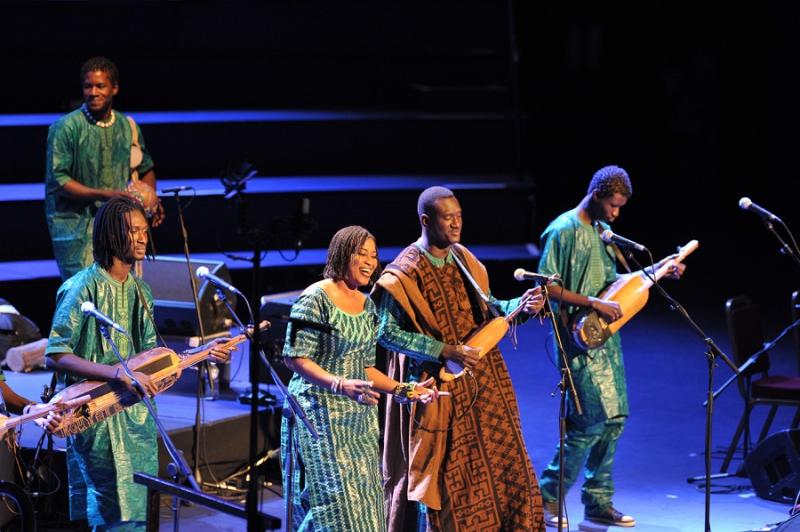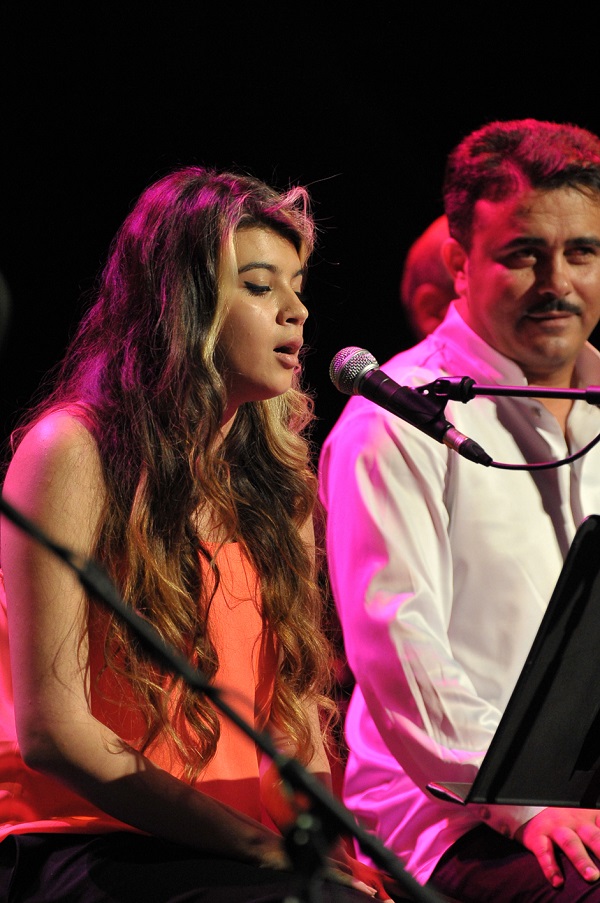Prom 54: World Routes | reviews, news & interviews
Prom 54: World Routes
Prom 54: World Routes
World Music celebration includes delights from Mali and Azerbaijan

Why are the Malians always punching way above their weight in music? There may be some historical reasons. The French always were more welcoming to the culture of their empire than the Brits (and more used to foreign-language music), while Paris became a great centre of West African music, from where it was disseminated over Europe.
This concert saw the debut of a highly appealing “chamber” Malian group Trio Da Kali, who play classy Mandé griot music – the trio consist of bass ngoni (lute), balafon (wooden-keyed xylophone) and the sweet, clear voice of Hawa Kassé Mady Diabaté (daughter of a legendary Malian singer). The pared-down line-up was a tremendous showcase for the sinuous and natural musicianship of the group. Often when you see a larger ensemble like the Symmetric Orchestra the colours are so varied they can become a blur.
 In fact, it was in the Symmetric Orchestra that I first caught the evening’s headliner Bassekou Kouyaté (in a Bamako club heaving with locals dressed up to the nines and dancing with nonchalant elegance). Bassekou has established himself over the last few years and three albums with his ngoni-driven group Ngoni ba. The impression was of something both bang-up-the-minute but with roots going back centuries. They have created an intense group energy and a real authority, able to tranfix both vast festival crowds and the less obviously conducive surroundings of a 25-minute set in the Albert Hall with festive songs like the title track of their last album Jama Ko, as well as pre-colonial songs like “Simaly”, while touching on Mali’s recent problems in “Ne me fatigue pas”.
In fact, it was in the Symmetric Orchestra that I first caught the evening’s headliner Bassekou Kouyaté (in a Bamako club heaving with locals dressed up to the nines and dancing with nonchalant elegance). Bassekou has established himself over the last few years and three albums with his ngoni-driven group Ngoni ba. The impression was of something both bang-up-the-minute but with roots going back centuries. They have created an intense group energy and a real authority, able to tranfix both vast festival crowds and the less obviously conducive surroundings of a 25-minute set in the Albert Hall with festive songs like the title track of their last album Jama Ko, as well as pre-colonial songs like “Simaly”, while touching on Mali’s recent problems in “Ne me fatigue pas”.
The other performers were on a completely different tangent, playing Mugham music from Azerbaijan. The performance was the culmination of this year’s World Music Academy in which a young musician gets mentoring from an established one, in this case 18-year-old Fidan Hajiyeva, who lives in London, and the established master of Mugham from Baku, Gochaq Askarov, whose dramatic voice was certainly impressive (Hajiyeva and Askarov pictured above right).
The quartet of musicians - including the four-stringed kamancha, oud and the oboe–like balaba - certainly intrigued and had moments of real atmospheric beauty, but they didn’t have quite the ease of group dynamics as Ngoni ba, whose bluesy music is naturally more accessible to a European audience. A problem for Askarov is that Alim Qasimov, one of the world’s great singers, also performs in this style. Coming in his wake must be akin to following in the footsteps of Bob Marley or Fela Kuti. Whereas Qasimov combines an academic approach with shocking fire and passion, this group were relatively bloodless, however accomplished as musicians. As for Fidan Hajiyeva, she isn’t the finished article but clearly has enormous talent and potential, and the freshness and sweetness of her voice was one of real highlights of the night.
rating
Explore topics
Share this article
Add comment
The future of Arts Journalism
You can stop theartsdesk.com closing!
We urgently need financing to survive. Our fundraising drive has thus far raised £33,000 but we need to reach £100,000 or we will be forced to close. Please contribute here: https://gofund.me/c3f6033d
And if you can forward this information to anyone who might assist, we’d be grateful.

Subscribe to theartsdesk.com
Thank you for continuing to read our work on theartsdesk.com. For unlimited access to every article in its entirety, including our archive of more than 15,000 pieces, we're asking for £5 per month or £40 per year. We feel it's a very good deal, and hope you do too.
To take a subscription now simply click here.
And if you're looking for that extra gift for a friend or family member, why not treat them to a theartsdesk.com gift subscription?
more New music
 Album: Marina - Princess of Power
Sixth album from L.A.-based Welsh singer is over-the-top but rife with pop gems
Album: Marina - Princess of Power
Sixth album from L.A.-based Welsh singer is over-the-top but rife with pop gems
 Eva Quartet, St Cyprian's review - polyphonic bliss
The first concert in 17 years from the great Bulgarian vocal quartet
Eva Quartet, St Cyprian's review - polyphonic bliss
The first concert in 17 years from the great Bulgarian vocal quartet
 Album: Mary Chapin Carpenter - Personal History
Distinctive, intimate, perfectly pitched
Album: Mary Chapin Carpenter - Personal History
Distinctive, intimate, perfectly pitched
 Music Reissues Weekly: Gather In The Mushrooms
Stylish, Saint Etienne-compiled, gateway into the world of acid folk
Music Reissues Weekly: Gather In The Mushrooms
Stylish, Saint Etienne-compiled, gateway into the world of acid folk
 Album: Van Morrison - Remembering Now
As he approaches 80, a lush new set has an invigorated Van showing his mystical side
Album: Van Morrison - Remembering Now
As he approaches 80, a lush new set has an invigorated Van showing his mystical side
 Caroline, Islington Assembly Hall review - south London octet mesmerises
A thrilling fusion of post-rock, performance art and futuristic pop
Caroline, Islington Assembly Hall review - south London octet mesmerises
A thrilling fusion of post-rock, performance art and futuristic pop
 Album: Pulp - More
The very opposite of past it, this immersive offering is perfectly timed
Album: Pulp - More
The very opposite of past it, this immersive offering is perfectly timed
 Songhoy Blues, Hare & Hounds, Birmingham review - West African crew raise the roof
Reduced Malian band take Birmingham by storm
Songhoy Blues, Hare & Hounds, Birmingham review - West African crew raise the roof
Reduced Malian band take Birmingham by storm
 Album: Turnstile - NEVER ENOUGH
Hardcore, ambient and everything in between
Album: Turnstile - NEVER ENOUGH
Hardcore, ambient and everything in between
 Album: Little Simz - Lotus
A major hurdle in the UK star's career path proves to be no barrier
Album: Little Simz - Lotus
A major hurdle in the UK star's career path proves to be no barrier
 Album: Death In Vegas - Death Mask
Electronic music perennial returns with an hour of deep techno illbience
Album: Death In Vegas - Death Mask
Electronic music perennial returns with an hour of deep techno illbience

Comments
3 high quality groups at this